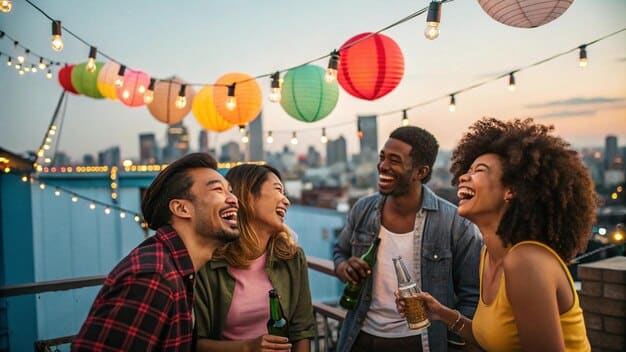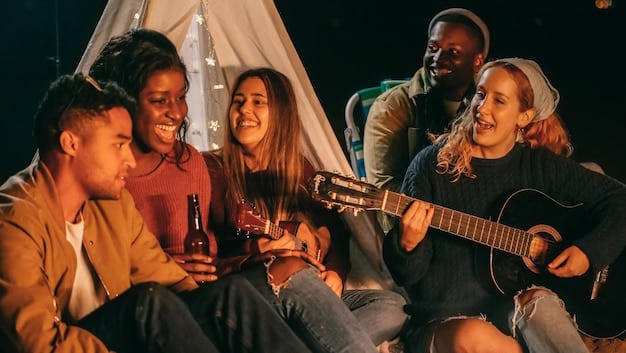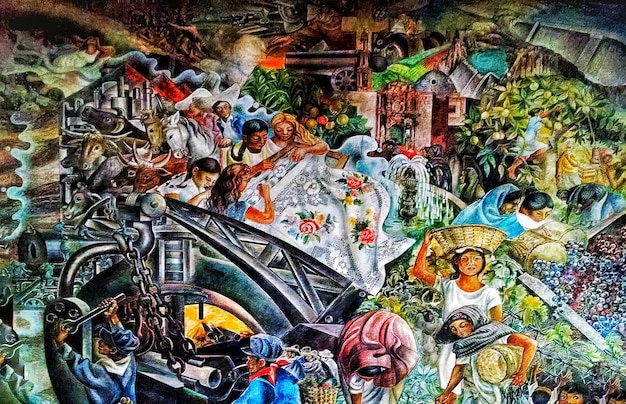Unexpected Benefits of Cultural Events in 2025: Beyond Entertainment

Advertisements
Attending cultural events in 2025 offers far more than just entertainment; it fosters profound cognitive growth, bolsters community mental well-being, and ignites innovative thinking within diverse social frameworks.
As the world continually evolves, the search for meaningful experiences intensifies. While vacations and digital entertainment offer fleeting distractions, there’s a unique and often underestimated power in live, communal experiences. In 2025, attending cultural events is proving to provide more than just an enjoyable outing; it offers profound, multifaceted advantages. Let’s discover the 3 unexpected benefits of attending cultural events in 2025, exploring how these gatherings enrich our lives in surprising ways, from boosting creativity to fostering stronger community bonds and improving overall well-being. These aren’t just pastimes; they are essential investments in our personal and collective futures.
Beyond Entertainment: Cognitive Enhancement Through Cultural Engagement
Cultural events often transcend mere amusement, acting as potent catalysts for cognitive development. Engaging with diverse forms of art, music, theater, and history challenges our perceptions, stimulates critical thinking, and broadens our intellectual horizons in ways that less active forms of entertainment simply cannot.
The immersive nature of cultural experiences forces us to process new information, interpret complex narratives, and engage with abstract concepts. This active participation strengthens neural pathways and improves brain plasticity, leading to enhanced problem-solving skills and intellectual agility. Consider, for instance, a classical music concert. Beyond the melodies, the intricate structures, harmonies, and historical contexts invite a deeper form of listening and appreciation, engaging multiple cognitive functions simultaneously.
Stimulating Creative Thinking
One of the most remarkable benefits of cultural events is their capacity to ignite creative thinking. Witnessing novel artistic expressions or historical interpretations can break us free from conventional thought patterns and encourage innovative perspectives. This exposure to diverse creative processes can be particularly beneficial in an era where adaptability and original thought are highly valued.
- Exposure to new ideas and forms of expression.
- Encouragement of divergent thinking and brainstorming.
- Inspiration for personal and professional projects.
- Development of a more flexible and open mindset.
Enhancing Problem-Solving Skills
Navigating the nuances of a contemporary art exhibit or understanding the intricate plot of a theatrical performance often requires a subtle form of problem-solving. We interpret symbols, connect disparate elements, and construct meaning from fragmented information. This iterative process hones our analytical capabilities, preparing us to tackle complex challenges more effectively in other areas of life.
Furthermore, the stories and histories presented in cultural contexts often mirror real-world dilemmas, albeit through an artistic lens. By observing how characters or historical figures confront and resolve conflicts, attendees can gain new insights and strategies applicable to their own circumstances. This intellectual exercise, subtle as it may seem, is a powerful cognitive workout.
In essence, attending cultural events is not a passive activity. It is an active engagement that demands our intellectual faculties. From dissecting the symbolism in a painting to understanding the cultural significance of a traditional dance, each interaction builds a richer, more complex cognitive framework. This sustained mental stimulation is crucial for maintaining cognitive health and fostering lifelong learning.
Cultivating Community: The Impact on Mental Well-being
In an increasingly isolated world, cultural events serve as vital hubs for fostering social connection and strengthening community bonds. These shared experiences provide a sense of belonging, reduce feelings of loneliness, and significantly contribute to overall mental well-being. The collective enjoyment of art, music, and performance creates a powerful sense of unity among participants.
When people gather for a concert, a play, or a festival, they become part of something larger than themselves. This communal engagement offers a counterpoint to the often isolating nature of digital interactions, providing authentic human connections that are essential for mental health. Research consistently shows that strong social connections are a key determinant of happiness and longevity.
Strengthening Social Bonds
Cultural events are ideal settings for forging new relationships and deepening existing ones. They provide natural conversation starters and shared interests, making it easier for people to connect. Whether it’s discussing a performance at intermission or sharing a meal at a food festival, these interactions build the social fabric of a community.
- Opportunities for shared experiences and discussions.
- Facilitation of new friendships and networking.
- Reinforcement of family and community ties.
- Creation of lasting memories through communal activities.
Reducing Stress and Anxiety
The act of immersing oneself in a cultural event can be a powerful antidote to stress and anxiety. The focus required to appreciate a live performance or an intricate exhibit can divert attention from daily worries, offering a temporary escape. The positive emotions evoked by art and music, such as joy, wonder, and inspiration, are known to have a calming effect on the mind and body.
Moreover, the structured yet relaxed environment of many cultural events promotes a sense of safety and comfort. This allows individuals to relax their guard, participate freely, and enjoy the present moment without the pressures often associated with everyday life. The collective laughter at a comedy show or the shared awe at a breathtaking display of fireworks are powerful stress relievers.

The mental well-being benefits extend beyond the immediate event. The positive memories and connections formed continue to have a lasting impact, providing a mental reservoir of joy and belonging to draw upon. By participating in cultural events, individuals not only enrich their own lives but also contribute to a more cohesive and supportive community, a key factor in societal mental health.
Fostering Innovation: Cultural Cross-Pollination and Creative Breakthroughs
Cultural events are prime incubators for innovation, serving as crossroads where diverse ideas, disciplines, and perspectives converge. This cross-pollination of cultures and concepts sparks creative breakthroughs that can ripple through various sectors, from technology and design to social policy. When people from different backgrounds share a common experience, new insights and solutions often emerge.
Think about a global food festival, for example. Beyond the culinary delight, such an event exposes attendees to different cultural practices, ingredients, and cooking techniques. This exposure can inspire chefs, food scientists, and even entrepreneurs to think differently about sustainability, packaging, or new fusion dishes. The indirect benefits of such exposure are vast and often unpredictable, yet consistently enriching.
Inspiring Interdisciplinary Collaborations
Many cultural events inherently blend different art forms or bridge the gap between art and science. A performance that integrates dance with digital projections, or an exhibit that uses scientific data to create an artistic display, exemplifies such interdisciplinary approaches. These hybrid experiences demonstrate the power of collaboration and often inspire participants to seek similar synergies in their own fields.
- Encouragement of diverse art forms and expressions.
- Bridging the gap between various academic and professional fields.
- Development of holistic perspectives on complex issues.
- Promotion of collaborative problem-solving efforts.
Catalyzing Economic Growth
While often overlooked, cultural events are significant drivers of economic innovation and growth. They not only directly employ artists, organizers, and vendors but also stimulate local businesses, tourism, and infrastructure development. The unique demands of putting on a large-scale event, from stage design to ticketing technology, can foster innovation in various supporting industries.
Furthermore, cities and regions that invest in a vibrant cultural scene often become magnets for creative talent and innovative companies. A rich cultural landscape is a powerful indicator of a dynamic and forward-thinking environment, attracting individuals and businesses who value creativity and intellectual stimulation. This, in turn, fuels further economic and social innovation.

The exposure to different cultures through events can also challenge established norms and encourage a more inclusive approach to design, marketing, and product development. By understanding and appreciating diverse perspectives, businesses and innovators can create products and services that resonate with a broader global audience, leading to truly transformative solutions. Cultural events are not just about consumption; they are about creation and evolution.
| Key Aspect | Brief Description |
|---|---|
| 🧠 Cognitive Boost | Cultural engagement sharpens critical thinking, expands perception, and fosters creative problem-solving. |
| 🤝 Community & Well-being | Shared experiences strengthen social bonds, reduce isolation, and significantly enhance mental health. |
| 💡 Innovation Catalyst | Exposure to diverse cultures sparks interdisciplinary collaborations and drives economic innovation. |
| 🔄 Cultural Exchange | Provides platforms for understanding and appreciating global customs, enriching personal perspectives. |
Frequently Asked Questions About Cultural Events
A cultural event encompasses a wide range of activities that celebrate human expression and heritage. This can include art exhibitions, music concerts, theatrical performances, dance festivals, literary readings, historical reenactments, and traditional celebrations. Essentially, any gathering that showcases and shares aspects of a particular culture or artistic discipline falls under this category, providing unique opportunities for learning and enjoyment.
Cultural events strengthen communities by providing shared experiences that foster social cohesion and interaction. They create opportunities for people to gather, connect, and bond over common interests, reducing isolation and enhancing feelings of belonging. These events often celebrate local identity and traditions, reinforcing a collective sense of pride and shared heritage among residents. They also serve as platforms for dialogue and understanding across diverse groups within a community.
Yes, cultural events can significantly improve mental health. Engaging with art, music, and performances can reduce stress, anxiety, and depression by providing emotional release and a sense of escape. They stimulate positive emotions, foster social connections, and offer opportunities for mindfulness and reflection. The sense of community and shared joy experienced at these events also contributes to overall psychological well-being and a more optimistic outlook.
Absolutely, cultural events are highly beneficial for children’s development. They expose children to new ideas, diverse perspectives, and different forms of expression, which can spark curiosity and creativity. Attending concerts, plays, or museum exhibits enhances their cognitive skills, language development, and emotional intelligence. These experiences also provide valuable learning opportunities outside the traditional classroom setting, fostering a lifelong appreciation for arts and culture.
Cultural events drive innovation by acting as hubs for cross-pollination of ideas and perspectives. Exposure to diverse artistic forms, traditions, and narratives can inspire new ways of thinking and problem-solving across various fields. They encourage interdisciplinary collaboration, challenge conventional norms, and spark creativity, leading to breakthrough developments in technology, design, business, and social practices. This environment fosters an open mindset essential for innovation.
Conclusion
In conclusion, the decision to immerse oneself in cultural events in 2025 extends far beyond casual entertainment; it’s an investment in holistic well-being and societal progress. The significant, often unexpected, benefits discussed—cognitive enhancement, community mental well-being, and catalytic innovation—underscore their profound importance. By actively participating in these vibrant gatherings, we not only enrich our individual lives with deeper understanding and stronger connections but also contribute to the collective fostering of creativity, empathy, and forward-thinking solutions that are increasingly vital in our complex world. Let these experiences be a reminder of the enduring power of shared human expression.





